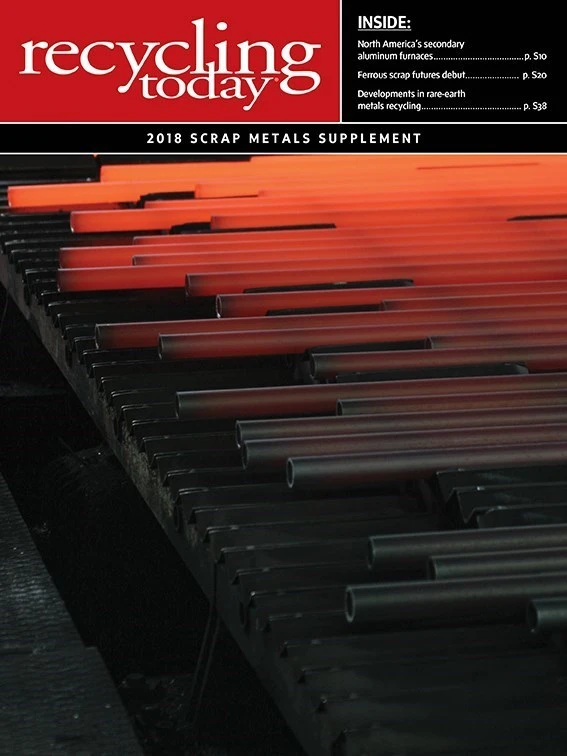
When considering
From investing in new equipment to acquiring former competitors, recycling companies have made moves to improve their operations in the last year. Much of this activity has been spurred by tightening quality requirements coming out of China.
As a result, recyclers are further separating metals, clearing a path for additional “cleaning” of
“It is now clear that additional cleaning will be required of this commodity to allow it to be exported to China,” Broughton says of
Confusion in China
In addition to creating higher-value materials, others say these Chinese import restrictions will help to grow the U.S. domestic market for
Bob Brewer, speaking on behalf of Scrap Metal Services (SMS), Burnham, Illinois, agrees it will be necessary to create higher-value products for domestic consumption.
Brewer, executive vice president of SMS, says, “With increasing export quality demands, it will be beneficial for recycling companies to produce more direct consumable grades of
In an alert to its members dated Nov. 16, 2017, the Institute of Scrap Recycling Industries (ISRI), Washington, says the Chinese government had notified the World Trade Organization of its intent to adopt new standards for the allowable contaminants thresholds for scrap imports by March 1, 2018. The new thresholds are set at a maximum of 1 percent for Category 6 nonferrous scrap and 0.5 percent for Category 7 mixed-metal scrap.
Bill Close,
Close says, “We have a changing market in that previously
Purchasing power
To create products that are worth more, recyclers say—and have shown through their buying power—investing in downstream recovery equipment is necessary. And they have reason to: Sources say
The same goes for China’s demand for higher-quality
As for domestic
“The need to source rich feedstock as well as operate an efficient separation system is paramount to stay competitive,” Brewer says.
One way SMS has stayed competitive is by using ultra-high-frequency eddy current separators in processing its shredded metals. Brewer says the investment in this technology has allowed the company to extract even more saleable materials from its shredded scrap streams.
Another company that will see an increase in
Bruce Keizler, vice president of nonferrous for SA Recycling, says this move absolutely will increase SA’s
In a sign of further investments, Tom Knippel of SA Recycling told the Decatur Daily in a follow-up article on the acquisition that the company expects to invest in technology to retain and grow SA’s new locations in Alabama and Tennessee.
Several other U.S. recycling companies purchased equipment in 2017 to better sort metals, including
Close says Wendt has sold between 10 and 15 MTB Cable Boxes in the year since it was introduced to the market. The MTB Cable Box is a compact wire chopping system. Designed to process up to 3 tons per hour of materials, the containerized system processes a range of “difficult-to-process materials,” the manufacturer says, including
SA’s Keizler says, “Investing in further processing could potentially add value by producing furnace-ready material instead of a product that needs to be further processed in order to be furnace ready.”
He says shredder feedstock will remain tight in 2018. In addition, as the market for domestic twitch (aluminum recovered from shredded automobiles) gets oversaturated, Keizler says it must find a home in the export market, lowering
Determining destinations
Finding new markets for
“The biggest change in the near-term is the available markets in which you can sell
At the end of October 2017, Andy Wahl, president of Atlanta-based TAV Holdings Inc. and vice president of the Bureau of International Recycling (BIR) Non-Ferrous Metals Division, writes in the BIR World Mirror on Non-Ferrous Metals that the
In his December 2017 report, Wahl writes that nonferrous metals saw “some stagnation in pricing, with spreads widening on red metals and aluminum.”
He adds, “Twitch prices have improved since the previous report, but the imbalance of domestic twitch and export
Looking to mid-March 2018, Wahl says bids and decisions would be expected by then regarding the bankruptcy filing of Real Alloy, a Beachwood, Ohio-based secondary aluminum producer. Real Industry Inc.,
Zorba is predominantly aluminum but may also contain copper, nickel, stainless steel, tin, zinc, lead and magnesium. – Institute of Scrap Recycling Industries’ Scrap Specifications Circular
“The plentiful supply of secondary aluminum scrap has also been thrown a curve ball by the recent bankruptcy filing of a major secondary aluminum consumer, pushing pricing down,” he writes.
In that same edition of the World Mirror, Shen Dong with OmniSource Corp., Fort Wayne, Indiana, supports the trend toward developing other markets, saying, “Many Chinese scrap processors believe that the new thresholds will dramatically reduce scrap imports into China in the near future; other regions will be developed for scrap processing.”
David Chiao, president of BIR’s Non-Ferrous Metals Division, writes in the December World Mirror that uncertainty surrounding China’s policy has “led many suppliers to develop their own processing of mixed metals.”
He continues, “Some Chinese importers are flooding in the direction of Category 6 items, while some consumers are beginning to focus on elsewhere other than China, with the top destination being Southeast Asian countries. Suppliers are also looking to other countries as alternatives to the Chinese market.”
Nevertheless, the future of
As Close says, “There’s always going to be an appetite for
WANT MORE?
Enter your email to receive our newsletters.

Explore the January 2018 Scrap Metals Supplement Issue
Check out more from this issue and find your next story to read.
Latest from Recycling Today
- Athens Services terminates contract with San Marino, California
- Partners develop specialty response vehicles for LIB fires
- Sonoco cites OCC shortage for price hike in Europe
- British Steel mill’s future up in the air
- Tomra applies GAINnext AI technology to upgrade wrought aluminum scrap
- Redwood Materials partners with Isuzu Commercial Truck
- The push for more supply
- ReMA PSI Chapter adds 7 members






